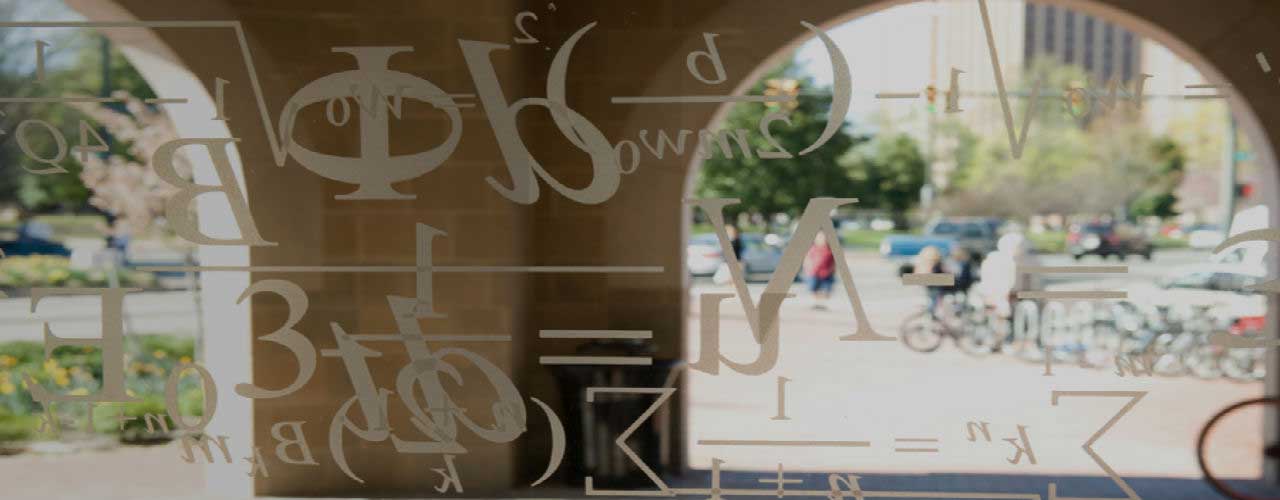
Undergraduate Program
The curriculum in mathematical sciences promotes understanding of the mathematical sciences and their structures, uses and relationships to other disciplines. To this end, the scholarly growth of the faculty and students in the mathematical sciences is nurtured through study, research and a high standard of teaching. The curriculum provides a sound foundation for the student seeking to enter a career with a technological orientation or for the student who wishes to pursue graduate study in applied mathematics, biomathematics, mathematics, operations research, statistics, teaching mathematics in secondary schools or related fields.
The Department of Statistical Sciences and Operations Research (in collaboration with the Department of Mathematics and Applied Mathematics) has several degree programs available offering a variety of options. The department offers a Bachelor of Science in mathematical sciences with a concentration in either operations research or statistics. In addition, the department offers a certificate in statistics, and for students in other programs, the department offers a minor in statistics.
What follows is a brief description of these programs:
Bachelor of Science in Mathematical Sciences
All students majoring in mathematical sciences are required to fulfill certain basic course requirements. There is a great deal of flexibility in choosing courses to fulfill these basic requirements. A student who wishes to emphasize one particular discipline for a concentration will have that indicated on the student's transcript. As an alternative to choosing a concentration, a student, in consultation with the adviser, could design an individual study program combining coursework in more than one of the disciplines represented in the mathematical sciences area. The decision to choose a particular concentration does not have to be made until the graduation application is submitted in the senior year, but the student should consult with an adviser to determine the timetable necessary to meet the necessary requirements.
Double Major Within the Mathematical Sciences Degree
A student who meets the requirements for two of the concentrations within the mathematical sciences degree (applied mathematics, mathematics, operations research and statistics) may receive a double major. The appropriate form for declaring a double major may be obtained from the University Enrollment Services/Records and Registration.
Post-Baccalaureate Undergraduate Certificate in Statistics
This certificate is accessible to persons with undergraduate majors in engineering, natural sciences, economics and other sciences, as well as to traditional mathematical sciences majors. The rationale for the program notes that while students in all these areas get some exposure to statistical concepts and methods, they often find themselves in jobs that require significantly more training in statistics than they received as undergraduates. The certificate program provides the same level of coverage of topics in statistics as the baccalaureate track in statistics, but fewer credits in mathematical sciences than would be required for a second major.
Undergraduate majors in statistics are rare, relative to the number of jobs that utilize statistical knowledge. Liberal arts majors in mathematics and in the social sciences who have had one or two courses in statistical methods as undergraduates often find themselves learning more advanced techniques on the job. The proliferation of short courses, often offered outside university settings, testifies to the need for more advanced skills in the work place. The certificate program offers individuals a more efficient and more effective avenue for receiving such training and getting appropriate credit for it.
For more information about our graduation rates, the median debt of students who completed the program, and other important information, please see the gainful employment website.
Students seeking to enter the certificate program in statistics should contact Dr. D'Arcy P. Mays for information on admission procedures.
Visit the VCU Bulletin for full program details, including requirements and courses.
Minors
The Department of Statistical Sciences and Operations Research offers a minor in statistics, and in collaboration with the Department of Mathematics and Applied Mathematics, a minor in mathematics. A student may not major and minor in the department.
A minor in mathematical sciences/statistics shall consist of at least 18 credits in courses labeled CMSC, MATH, OPER, or STAT, including a minimum of one semester of calculus and nine upper-level (300-500 level) credits in statistics courses.
Neither STAT 208 or STAT 210, nor any 100-level mathematics can be used to fulfill the required 18 credits. It is strongly recommended, but not required, that students seeking a minor in statistics take STAT 212 Concepts of Statistics. A minimum grade-point average of 2.0 must be achieved in the minor.